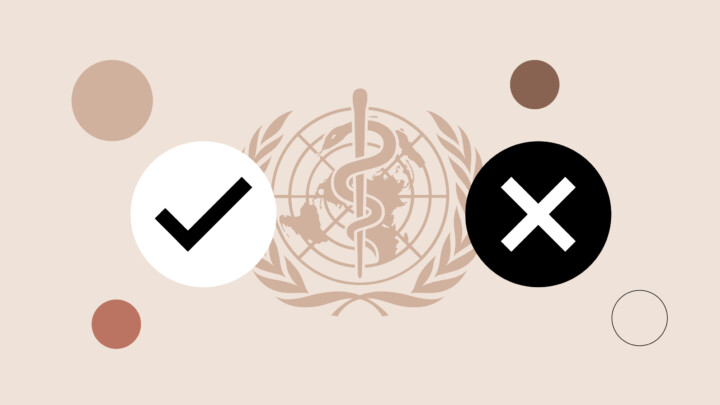
82% of physicians on Sermo believe recent U.S. global health care funding cuts will worsen the crisis.
It’s a striking figure, revealing just how concerned frontline clinicians are about the future of global health. But dig into the Sermo community, and you’ll find that not all doctors see the situation the same way.
Some physicians describe the cuts as a “direct threat” to already fragile health ecosystems. Others argue that years of international healthcare fraud mean that reform is long overdue. That tension reflects a much broader question: what happens when the world’s most powerful health donor withdraws its support?
Recent U.S. policy shifts under President Trump have slashed billions from programs like PEPFAR and Gavi, dismantled USAID’s global health functions and frozen most new NIH grants to international partners. For some countries, the fallout is already real with the threat of clinical trials being paused and even healthcare workers being laid off.
This article explores how physicians on Sermo are responding to this turning point. Drawing on Sermo member insights and community discussions, we’ll look at the funding vacuum, the search for new leadership and what global health really needs to survive and adapt.
The fragility of global health without U.S. support
While the funding cuts shocked many, few physicians were surprised by how deeply they might destabilize global health infrastructure.
According to a Sermo poll, 53% of physicians said the cuts will “significantly” worsen the global health crisis. Another 29% expect at least some worsening. But while that’s an overwhelming majority, it’s not the full picture. Nearly half of physicians still believe the global health community is at least moderately prepared to face the future without U.S. backing.
That tension between broad concern and pockets of confidence runs throughout Sermo community discussions on this topic. There’s recognition that the current system, for all its flaws, still holds potential. Regional coalitions, NGOs and the WHO haven’t disappeared. However, there is a sense that without decisive coordination, even resilient structures could falter under pressure.
For some nations, though, the global health issues due to this funding gap are already building. One infectious disease specialist in South Africa described the fallout from PEPFAR funding cuts: “Thousands of jobs lost… vital surgeries cancelled… no posts for graduating doctors.” The collapse of U.S. support has made for a much weaker healthcare system. With Development Assistance for Health (DAH) at its lowest level in 15 years, these cuts could reverse decades of progress in areas such as HIV/AIDS, malaria, tuberculosis, and maternal and child health.
Other Sermo members warned about knock-on effects. Diseases don’t respect borders. One internal medicine physician put it bluntly: “If [diseases] are allowed to proliferate in poorer countries they will make it to the US. This was a huge mistake.”
Who should fill the gap?
With the U.S. stepping back, physicians are divided on who should lead global health efforts going forward. The EU emerged as the top choice as voted by physicians on Sermo, but only 28% of respondents selected it. NGOs, such as the Gates Foundation, followed at 22%, with international coalitions and China close behind.
This spread reflects a leadership vacuum, but not necessarily a leadership void. Physicians appear to be waiting for someone, or several actors, to step up. Through domestic philanthropy and private sector engagement, some of the worst-affected countries are already doing so. There’s hope in the potential of NGOs and the private sector, even if it’s tentative. One surgical resident captured this mood: “The gap to be filled is very necessary and I believe and hope the private sector and NGOs can step up.”
But hope alone won’t create sustainable systems. Several voices in the Sermo community urged a move away from dependency on any single actor. One GP noted, “The WHO shouldn’t depend that much on only one country… we should advocate for income diversity amongst other countries.”
What physicians seem to advocate for isn’t necessarily a new global health superpower, but a more collaborative, decentralised structure that prevents the kind of vulnerability exposed by the U.S. exit.
The debate: Was withdrawing WHO funding the right move?
If the leadership issue is a question of who and how, the WHO debate centers on why. In the same Sermo poll, 62% of physicians said the U.S. was wrong to pull WHO funding. But that still leaves room for disagreement: 22% said it was the right call and 14% weren’t sure.
What emerges from the comments is that this isn’t simply a clash of ideologies. Even among critics of the funding cut, there’s frustration with the WHO’s political entanglements and perceived mismanagement. One psychiatrist argues the decision was justified because “the WHO did a horrible job in standing up for the health care of the world.” Meanwhile, a family medicine physician blames the Trump administration for damaging global credibility while still acknowledging that the WHO had “lost credibility.” This has led to a reduced global influence and according to this physician, a need to “search for support in other nations such as China and the G20”.
Ultimately, trust in international institutions has frayed. For some, reform means funding and strengthening the WHO. For others, it means withholding support until those reforms happen. Either way, the consensus lands on the idea that the current model isn’t working as it should.
What global health needs now
So, where do we go from here? The Sermo poll shows a strong appetite for system-wide reform. Diversifying funding was the top priority for 44% of physicians. Another 34% called for stronger international collaboration. Only 13% said we should focus on advocating for renewed U.S. support. That speaks volumes.
Physicians aren’t hoping for a return to the old status quo. Instead, they’re hoping for a system that isn’t held hostage by any single country’s politics. A path forward might include regional emergency health funds, greater involvement from physician-led coalitions and a broader basket of contributors. But decentralisation only works if it comes with accountability.
As one pathologist warned, “Countries with rampant corruption need to step up… funds need to be diversified.” There’s a clear call for governance reforms – and not just financial ones. There’s a general view that throwing money at this problem without establishing frameworks for its responsible use is simply throwing money away.
Economic arguments also carry weight. A pediatric psychiatrist noted, “If people get sick, they stop being productive.” It’s a pragmatic point, echoed by others who see underfunded health systems as a recipe for economic instability.
A GP summed up this tension well: “Would a ‘no care, no cure’ approach lead to unintended consequences?” It’s a question that cuts to the heart of global health policy. Is short-term savings worth the long-term cost?
Key takeaway
Physicians on Sermo overwhelmingly believe that defunding global health is a step in the wrong direction. However, the response is not a simple return to the past, but instead revolves around the idea that this is an opportunity to create something better. There’s no single answer, but clear themes have emerged: decentralisation, accountability and smarter, more sustainable funding models.
Instead of this being about replacing one funder with another, it appears to be about how the world protects cross-border healthcare.
Whether we’re prepared or not, the next global health crisis is likely already brewing. What comes next depends on who’s willing to lead and how well the world listens to its physicians.















